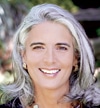by Maria Sirois
There are moments in life when the forces that be hit us over the head and say, “Here. Now. Pay attention. This is important.” Infants arrive, towers fall, homes burn, lost ones return, illness erupts, children die—such moments carry with them a potency and a possibility. In these concussive moments we are left with a choice: to open our hearts and gather what wisdom we can or to shut down and in effect, walk away. In “The Summer Day,” poet Mary Oliver challenges “what is it you plan to do with your one wild and precious life?” The question streaks like an arrow shot through time from the voices of mystics, philosophers, and writers. In The Writing Life, Annie Dillard answers, demanding that we “play it, lose it, all, right away, every time,” and from centuries back Gerard Manley Hopkins, Jelaluddin Rumi, and Kabir offered the same sentiment. In “The Time Before Death,” Kabir wrote:
Jump into experience while you are alive!
Think … and think … while you are alive.
What you call “salvation” belongs to the time before death.
The time is now, the elders advise. Even in moments of great suffering, the time is now to connect deeply to the experience of our very own lives. “A mountain worth climbing,” I tell myself and my psychotherapy clients, knowing full well that it is a steep but invaluable climb.
During my childhood, Highland Terrace, Gloversville, New York, marked the west side of the poor section of town. First- and second-generation immigrant families mingled with blue-collar mill workers, teachers, seamstresses, and laborers. We all knew each other’s names, and the twenty-or-so kids on my block met daily at the top of our hill for kickball, spud, tag, and hide-and-seek. I had school buddies up and down the block, cousins living in the house behind ours, and my grandmother next door. Despite the fun and games, the everyone-looks-out-for-each-other feeling, and the safety of our sidewalks, from my earliest conscious memory, I was a worrier.
I memorized the faces of abducted children on milk cartons and would scan the lines at the A&P trying to find them. I saved pennies to send to starving children in Africa and India and prayed nightly for those who were sick. One afternoon, when I was eight, I gave away the hand-sewn beaded Barbie dresses my grandmother had made for me to a girl with even less than we had. When my mother confronted me that night, I cried from frustration. I had no words to tell her that I felt I had to help.
Twenty years later, I volunteered at the New England Deaconess Hospital Mind/Body Clinic (now called the Mind/Body Medical Institute at Beth Israel Deaconess Hospital) before entering graduate school. At the Deaconess, I learned that not everyone is cured through medicine alone—often the spirit, the heart, and sometimes the body are best served through a combination of support from the fields of psychology, medicine, and faith. I believed that somehow integrated disciplines could truly ease suffering, and in order to understand this concept more deeply, I entered graduate school in clinical psychology, studied the integration of psychotherapy and faith systems, and chose the med-psych pediatric oncology rotation at the Dana-Farber Cancer Institute for my last year of clinical training. I did not know how difficult the year would be for me personally, how it would strain my heart and my faith. I would leave the hospital a different woman than when I had entered.
Coming to know children in pain taught me the limits of my profession and its usefulness—how psychology, through its adherence to language and conversation, offers only so much. It cannot prevent life’s capricious touch, cure physical disease, or return a dead relative. And yet the act of listening to a person over time can bring about extraordinary changes for any human being, changes that can help a child love herself even as her body deteriorates or help an adult discover capacities for resilience, compassion, and joy.
—This post was originally published in Kripalu: Thrive.
Dr. Maria Sirois, PsyD, is the Vice President of Curriculum at Wholebeing Institute and an inspirational speaker, seminar leader, and author who has worked at the intersections of wellness, psychology, and spirituality for nearly 20 years. As a wellness guide, Maria has been invited to keynote throughout the country at conferences for wellness centers, hospitals, hospices, philanthropy, business, academic and corporate institutions, as well as for the general public. She has been called both a “true teacher” and “an orator of great power and beauty.” Her book, “Every Day Counts: Lessons in Love, Faith, and Resilience from Children Facing Illness, was published in 2006.”










